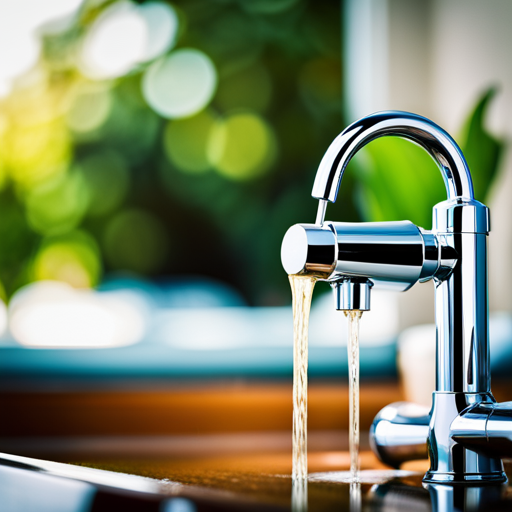If you’re concerned about the quality of your drinking water, you’re not alone. Many people worry about the presence of harmful contaminants and chemicals in their tap water, but thankfully, there are solutions available.
One of the most effective ways to improve the safety and quality of your drinking water is with a PUR filter. These filters use advanced technology to remove a wide range of contaminants, including some that may surprise you.
In fact, PUR filters are certified by NSF to remove 15 different types of contaminants, including chlorine, lead, benzene, and even pharmaceuticals. With a PUR filter, you can enjoy cleaner, safer, and better-tasting water right from your own tap.
In this article, we’ll take a closer look at how these filters work, the surprising contaminants they can remove, and why they’re an essential addition to your home.
Key Takeaways
– PUR filters are effective in removing a wide range of contaminants, including lead, benzene, and pharmaceuticals.
– Different PUR filters have different lifespans and costs, so it’s important to choose the best fit for your household’s needs.
– Exposure to contaminants such as lead and benzene can cause serious health issues, so investing in a quality water filter like PUR can greatly improve the quality of your drinking water.
– Some households may have specific water quality issues that require a more specialized filtration system, so it’s important to evaluate all options before choosing a water filter.
Contaminants Removed
You’ll be happy to know that PUR filters remove a variety of harmful contaminants and chemicals, including chlorine, lead, benzene, turbidity, mercury, pharmaceuticals, pesticides/herbicides, trichlorobenzene, and atrazine, as listed on the packaging and certified by NSF.
These contaminants can enter your drinking water through various sources, and exposure to them can cause serious health issues. For example, lead exposure can cause behavioral issues and learning disabilities in children, while increased turbidity is linked to dangerous microorganisms.
It’s important to note that not all PUR filters are certified to remove all contaminants, so be sure to check the packaging and certification standards before purchasing a filter. Additionally, the filter lifespan and cost will vary depending on the model.
However, investing in a quality water filter like PUR can greatly improve the quality of your drinking water and protect you and your family from harmful contaminants.
Importance of Lead and Benzene Removal
It’s important to be aware of the potential harm that lead and benzene can cause if they’re not removed from your drinking water. Exposure to lead can lead to lead toxicity, which can cause behavioral issues and learning disabilities in children. The maximum contaminant level goal for lead is 0 mg/L, which means that it’s important to remove any trace of lead from your drinking water.
Benzene, on the other hand, is a known carcinogen that can cause a variety of health effects, including anemia, excessive bleeding, and immune system damage. The drinking water standard for benzene is 5 ppb, which means that even small amounts of benzene exposure can be harmful.
PUR filters are effective at removing both lead and benzene from your drinking water. By using activated carbon, ion exchange resin, and particle filters for purification, PUR filters can effectively remove these harmful contaminants and chemicals from your water.
It’s important to choose a PUR filter that is certified to remove these contaminants, as not all PUR filters are designed to remove the same contaminants. By choosing a filter that specifically targets lead and benzene, you can ensure that your drinking water is safe and free from harmful contaminants.
Limitations and Considerations
When choosing a water filtration system, it’s important to consider the limitations and specific needs of your household.
PUR filters, while effective in removing many contaminants, have different lifespans and costs depending on the model. It’s important to take into account the frequency of filter changes and the overall cost effectiveness when selecting a PUR filter.
It’s important to check the packaging and consult with a professional if necessary because some PUR filters may not be certified to remove all contaminants.
Additionally, some households may have specific water quality issues that require a more specialized filtration system. It’s important to evaluate all options and choose the best fit for your household’s needs.
Conclusion
So, there you have it! PUR filters are a great way to improve the safety and quality of your drinking water. They use a combination of activated carbon, ion exchange resin, and particle filters to remove harmful contaminants and chemicals from your tap water.
Not only are they certified by NSF to remove a variety of contaminants, including chlorine, lead, benzene, turbidity, mercury, pharmaceuticals, pesticides/herbicides, trichlorobenzene, and atrazine, but they can also remove 15 surprising contaminants that you may not have even known were in your water.
Lead and benzene are two of the most important contaminants that PUR filters can remove, as they can have serious health effects if consumed over time. It’s important to note, however, that PUR filters do have some limitations and considerations. For example, they may not remove all contaminants and should be replaced regularly to ensure optimal performance.
But overall, if you want to ensure that your drinking water is safe and free from harmful contaminants, a PUR filter is definitely worth considering.
